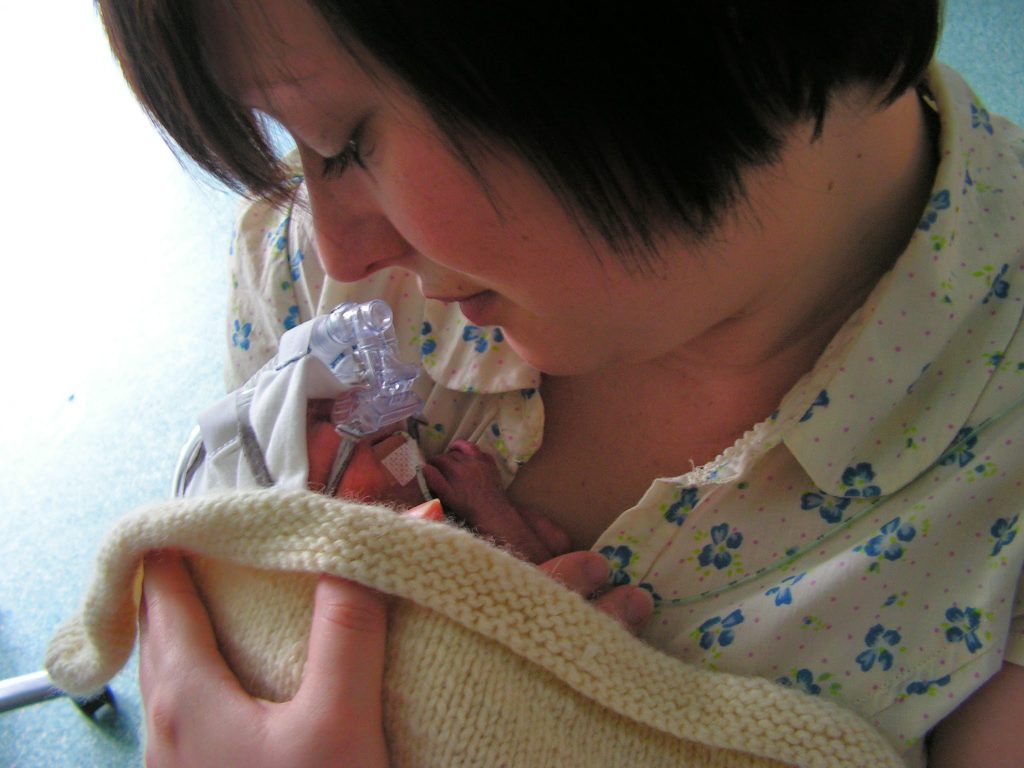Leanne and Katy’s story

Leanne Richards from Merthyr Tydfil was working as a paediatric nurse at Great Ormond Street Hospital when she suddenly went in to labour at exactly 25 weeks pregnant. She’d had a particularly difficult shift at work the day before when one of the patients she was caring for went in to cardiac arrest. She thinks the physical and emotional stress of that incident bought on her early labour.
Despite the medical team’s best efforts to stop Leanne’s labour, baby Katy was born after just three hours weighing a tiny 1.7lb. Katy was rushed immediately to a unit specialising in extremely premature babies where she had a very rocky start.
Leanne says: “The first 72 hours of Katy’s life were extremely precarious and at times we really didn’t think she was going to survive. She had so many bleeds on her brain during those first few days that at one point, the doctors talked to us about discontinuing care if she had many more. Thankfully the bleeds stopped and we didn’t need to make that awful decision but the worst was far from over. Katy battled through several infections, sepsis and a hole in the heart. I had no idea how such a tiny fragile thing could endure so much, but she just kept on going.”
With everything that was going on Leanne and her husband Mark found it almost impossible to bond with their baby at first. Like all parents of neonatal babies, they were suddenly faced with having to adjust their expectations of parenthood, standing by as someone else acted as their baby’s primary carer while all they could do was anxiously watch and wait. For Leanne, her inability to bond was further compounded by her nursing background.
She explains: “Because I hadn’t had the chance to bond with Katy as her mum I just went in to medical mode. Instead of soothing her and stroking her, I was checking her blood gas levels and ventilation. Perhaps looking back part of that was a defence mechanism but what I really needed was to step back and give myself the space to learn to become Katy’s mum.”
With the encouragement of the neonatal team, Leanne started to do the things she would have done had she been at home with Katy, like read to her and establish a routine. And eventually, after three long months of uncertainty Katy, exactly 3lb by this point, was strong and well enough to go home. They moved home to Wales a week later.
Katy is now nine-years-old and although deaf as a result of her premature birth, she is otherwise a healthy and happy girl who, her mum says, will one day change the word. However, Leanne’s experience of witnessing her daughter’s struggle for life inspired her to change career and as soon as she was able, she re-trained as a neonatal nurse.
“I’d never looked after a neonatal baby until I had Katy and I was just completely bowled over by how such a tiny fragile person could have so much fight. Each and every one of the babies I’ve cared for since has been an absolute inspiration. It’s strange to equate courage to a small baby but that’s definitely what you feel like they have.
“I’ll never forget the doctors and nurses who played a part in our journey with Katy. They sit with you through the bad times and celebrate with you through the good and their support was what kept our heads above water. After what happened with Katy, I wanted to be that for someone else. It’s a total privilege to work with these families. It’s a very special feeling knowing that, whether the outcome is good as it was for us or bad, like it sadly is for some families, I’ve played a part in memories that they will hold dear forever.”
Leanne is looking forward to working on the new unit and, having been in the situation herself, is very pleased that it will house enhanced provision for parents and families.
“Having a room where you can relax for ten minutes while doing the very important job of expressing milk for your baby, or having a family room to spend a few days with your baby on the unit as parents before making the much anticipated but daunted transition home, is so important when you’ve spent weeks and months at your unwell baby’s side.”
As well as funding vital equipment like ventilators and incubators, donations to the Tiny Lives Appeal will help support parents facing weeks and months of huge worry and uncertainty. It will provide video monitors so that mums recovering from birth can see their babies in the anxious hours before they can be visited on the unit and family rooms where parents can be supported in caring for their infant before they leave hospital.
For more information, visit our Tiny Lives Appeal page.







